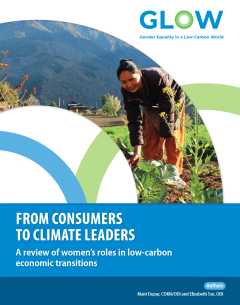
Women bear a greater burden of unpaid work in the care economy, worldwide, and disproportionately shoulder the effects of shocks. In this sense, women’s economic empowerment must be integrally mainstreamed in the global transition to a net-zero economy.
This study reviewed academic and grey literature and related policy debates to ascertain whether women’s economic empowerment has been integrated into discussion of low-carbon transitions. It found that, until now, there has been a general lack of integration of women’s economic empowerment in low-carbon transitions at economy-wide level.
Discussion of gender issues and people’s intersectional vulnerabilities – such as age, ethnicity, class, caste, disability – is superficial in the influential literature on the economics of climate change mitigation, which are often framed as ‘green economies’ or ‘green growth’. There is an immediate opportunity and urgency to address this gap.
